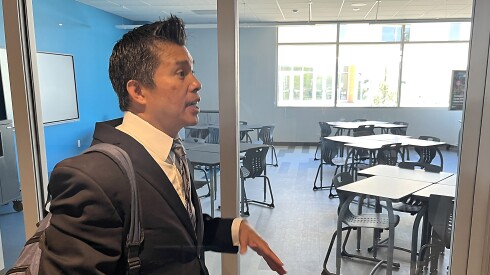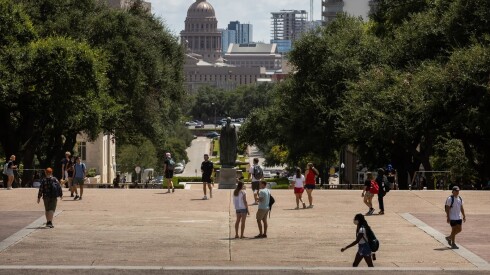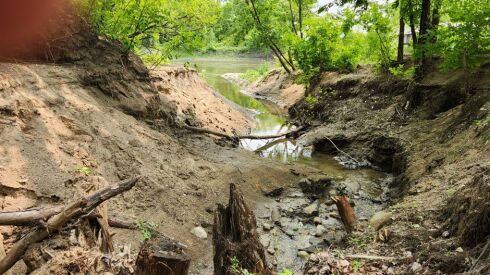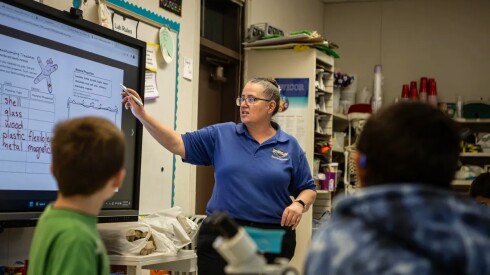Latest News
A statue in Times Square depicting an ordinary Black woman has held up a mirror to people's attitudes about race and celebration.
There are places we shouldn’t be living. With federal disaster aid uncertain, states and localities should build voluntary buyout programs to relocate residents from floodplains.
High schools are looking into “learning studios” that can be quickly adapted for different kinds of instruction. Not all teachers are buying into the idea.
The state is devoting $50 million to a research consortium looking into the effects of ibogaine, an illegal drug being touted by surprising psychedelics champion Rick Perry, a former governor.
Trump's decision to deploy the National Guard against anti-deportation protesters is sadly familiar after other attacks on the First Amendment.
Over the past two years, the city has reduced the average wait time by two-thirds. Ninety percent of calls are answered within 20 seconds.
The Legislature is poised to put a constitutional amendment on next year’s ballot that would make thousands of state jobs “unclassified,” allowing at-will firing of employees.
The city faces a $250 million shortfall. It’s hired 4,000 more workers over the past decade and expanded services, but post-pandemic spending patterns have led sales tax collections to flatten.
The latest technology revolution will eventually eliminate some of the public funds’ internal staff. To avoid being AI roadkill, pension systems and key employees need to take the initiative collectively.
Abbott has won a number of major legislative victories over the past couple of sessions, including a long-awaited expansion of school choice this year. His re-election next year is all but assured.
Rather than pulling special education kids out for separate instruction, it’s putting special ed teachers in classrooms with the general student population. Test scores are improving.
Nearly 20 states have created borrowers’ bill of rights and ombudsman offices to help borrowers figure out confusing paperwork and avoid default.
The office, established just six months ago, had asked for a 40 percent funding increase but came away with its budget cut by 20 percent.
Cities are banning landlords from setting rental prices based on algorithms and non-public data, which tenants complain have led to drastic spikes.
Like other states, North Dakota urgently needs more teachers. It’s among the first to adopt a model other sectors have used for decades.
As part of the city’s new $7 billion budget, the City Council approved bonding authority for Mayor Cherelle Parker's plan to create or preserve 30,000 housing units.
Work requirements through welfare have helped recipients find meaningful jobs. America has a vast workforce network at the ready to provide job placement services.
Local governments must review their risks and detection strategies and be better prepared for attacks. A state bill was prompted by a wave of cyber attacks against local agencies.
More than 5 million teenagers take care of older adults as part of their day, including nearly a third of high school students in at least one state. Their numbers may grow if Medicaid gets cuts.
A survey shows that more than half of manufactured homeowners on rented land have no lease.
Because reporting practices and requirements vary so much, extreme weather’s true damage cost is often a mystery. There are several ways to get better numbers.
Texas offered the benefit for 24 years. The move came in response to a federal lawsuit, but state leaders hailed it as a win.
Florida reopened schools earlier than some states but faces the same challenges of large shares of students missing a lot of school.
History suggests Republicans have a real shot, despite the state's blue leanings. In San Antonio, the mayoral election is also turning on partisan concerns.
A community foundation chose to take a chance on downtown rebirth.
Not everyone who wants to live in a dense walkable neighborhood is able to do so. A morass of regulations stands in the way.
While efforts to address climate change have faced a setback in Congress, state agencies, communities and citizens continue to plan and initiate projects that implement the state’s Climate Action Framework.
Currently, as part of their training, students work for free for a year as teachers or classroom aides. That creates an economic hardship that discourages some potential recruits.
The 1960s-era program put at-risk youth to work, but the Labor Department concluded its costs were too high and that privately-run facilities were rife with sexual abuse and other violence.
The one-time grant funding let cities and counties demonstrate new ideas and expand existing efforts to curb gun violence. When the ARPA sunsets, some efforts may scale down, but local governments have been planning to maintain the bulk of the work.
Sponsored
-
Sponsored
Most Read














































